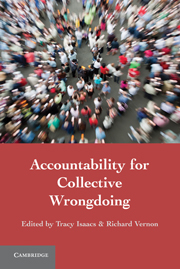Book contents
- Frontmatter
- Contents
- List of Contributors
- Acknowledgments
- Introduction
- PART I COLLECTIVE ACCOUNTABILITY IN INTERNATIONAL LAW
- PART II DISTRIBUTING ACCOUNTABILITY
- 7 Reparative Justice
- 8 The Distributive Effect of Collective Punishment
- 9 Citizen Responsibility and the Reactive Attitudes: Blaming Americans for War Crimes in Iraq
- 10 Kicking Bodies and Damning Souls: The Danger of Harming “Innocent” Individuals While Punishing “Delinquent” States
- 11 Punishing Collectives: States or Nations?
- Index
- References
9 - Citizen Responsibility and the Reactive Attitudes: Blaming Americans for War Crimes in Iraq
Published online by Cambridge University Press: 05 June 2012
- Frontmatter
- Contents
- List of Contributors
- Acknowledgments
- Introduction
- PART I COLLECTIVE ACCOUNTABILITY IN INTERNATIONAL LAW
- PART II DISTRIBUTING ACCOUNTABILITY
- 7 Reparative Justice
- 8 The Distributive Effect of Collective Punishment
- 9 Citizen Responsibility and the Reactive Attitudes: Blaming Americans for War Crimes in Iraq
- 10 Kicking Bodies and Damning Souls: The Danger of Harming “Innocent” Individuals While Punishing “Delinquent” States
- 11 Punishing Collectives: States or Nations?
- Index
- References
Summary
[I]f today I heard that some American had committed suicide rather than live in disgrace, I would fully understand.
– J. M. Coetzee, Diary of a Bad YearINTRODUCTION
It is now horrifyingly apparent that American prosecution of the war in Iraq, and its attendant detention policies, have been rife with abuses. American soldiers killed Iraqi civilians by throwing them into the Tigris, shooting them in “massacres” at Haditha and Mahmoudiya, or running them over in supply-carrying convoys intent on moving through traffic. During raids, it became “very common” to shoot the family dog in front of the family who owned it and routine to “destroy” the family's property with no subsequent compensation. Detainees died after having been exposed to extreme temperatures or subjected to stress positions; in one case, an Iraqi prisoner suffered a lethal heart attack after he was forced to do long sessions of jumping jacks with a sandbag over his head.
Cries of ignorance, perhaps once possible, are now unavailable and unavailing. The pictorial evidence has been too graphic, the pleas for judicial relief too numerous, and the revelations by journalists and veterans too widespread and wrenching, for Americans to invoke the Bush administration's penchant for secrets and deceit (and sometimes that of the Obama administration as well) as sources of immunity. The question of responsibility therefore presses upon us: what responsibility do Americans bear for these war crimes?
Information
- Type
- Chapter
- Information
- Accountability for Collective Wrongdoing , pp. 231 - 260Publisher: Cambridge University PressPrint publication year: 2011
References
Accessibility standard: Unknown
Why this information is here
This section outlines the accessibility features of this content - including support for screen readers, full keyboard navigation and high-contrast display options. This may not be relevant for you.Accessibility Information
- 4
- Cited by
